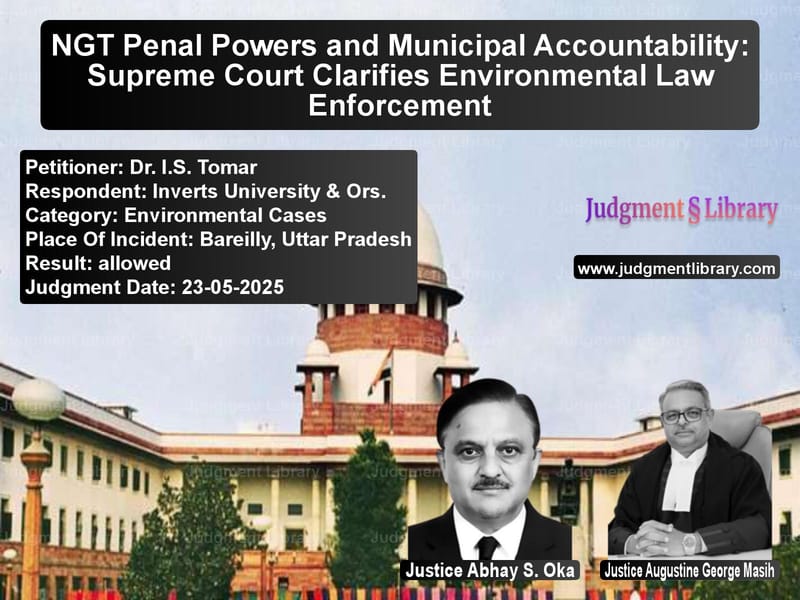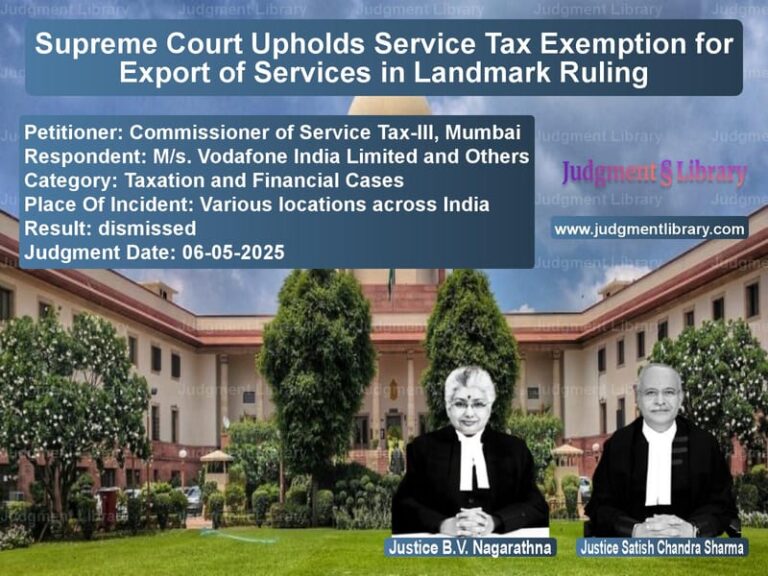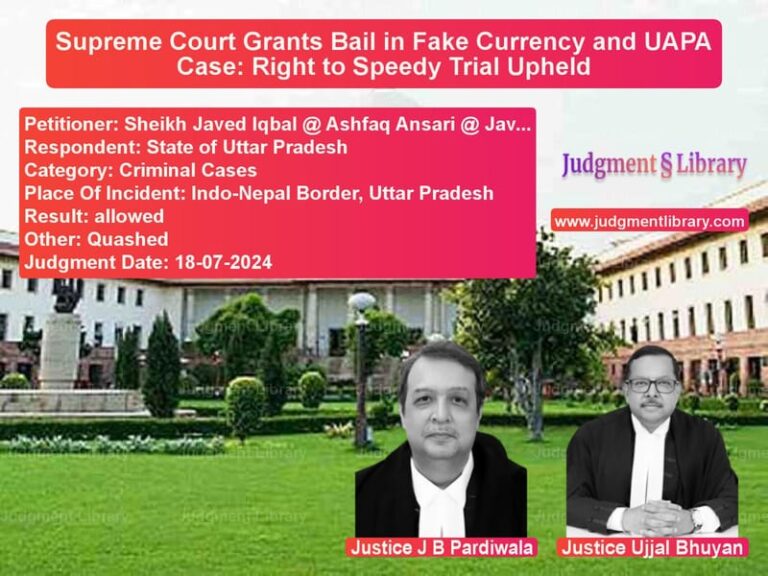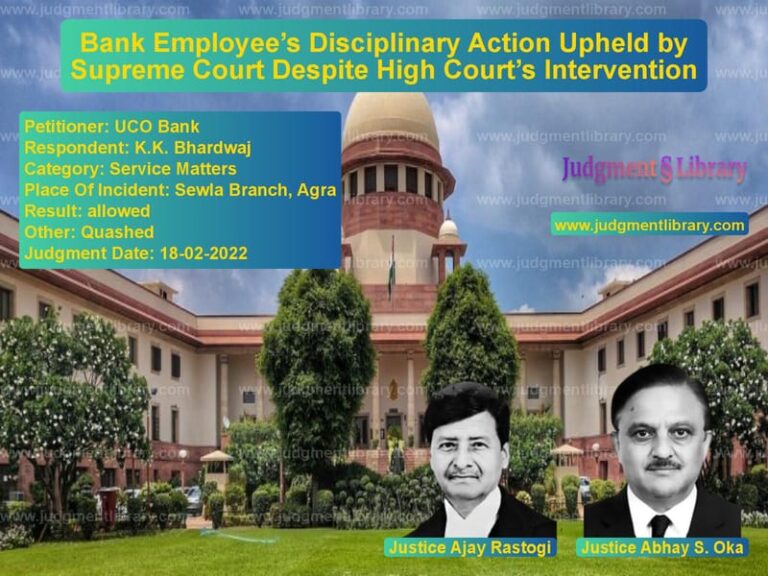NGT Penal Powers and Municipal Accountability: Supreme Court Clarifies Environmental Law Enforcement
In a significant ruling that clarifies the limits of penal powers under environmental law, the Supreme Court of India recently addressed the crucial question of who can be held accountable when government bodies fail to comply with environmental directives. The case emerged from a contentious dispute involving municipal solid waste management in Bareilly, Uttar Pradesh, where the National Green Tribunal had imposed severe penalties on municipal officials for alleged non-compliance with its orders.
The legal battle began when Rayons-Enlighting Humanity, Inverts University, and a group of residents from Village Razau Paraspur, Bareilly, filed separate applications before the NGT challenging the establishment and operation of a municipal solid waste management plant. The petitioners contended that the plant was set up in violation of the Environment Impact Assessment Notification, 2006, and sought the quashing of a circular that permitted the plant’s operation.
During the proceedings, on May 28, 2013, the NGT reserved its judgment while issuing an interim direction that no municipal solid waste should be dumped at the disputed site. Subsequently, on July 18, 2013, the NGT allowed the applications and directed the immediate closure of the solid waste management plant, restraining the Municipal Corporation from dumping any further waste and ordering the removal of all existing municipal waste within four weeks.
Read also: https://judgmentlibrary.com/auroville-township-plan-dispute-supreme-court-overturns-ngt-orders/
The situation escalated when applicants before the NGT filed miscellaneous applications alleging that dumping of solid waste had continued despite the tribunal’s clear directions. Specific allegations were made against Dr. I.S. Tomar, the then Mayor of Municipal Corporation, Bareilly, accusing him of not only being instrumental in violating the NGT’s orders but also making undesirable statements against the judgment to the press.
In its impugned judgment dated October 24, 2013, the NGT imposed severe penalties. It punished the Mayor and Commissioner of the Municipal Corporation with civil imprisonment till the rising of the court and a fine of Rs. 5 lakhs each. Additionally, the NGT imposed a fine of Rs. 1 lakh per day on the Municipal Corporation for causing environmental degradation and injury to public health during the period from May 28, 2013, to July 27, 2013.
The Legal Challenge
Dr. I.S. Tomar, the former Mayor, approached the Supreme Court challenging the NGT’s order. His counsel made several crucial arguments. “Learned counsel appearing for the appellant, at the outset, submitted that the appellant was not a party to the Original Application No. 99 of 2013 on which orders dated 28th May, 2013 and 18th July, 2013 were passed.” This fundamental procedural point formed the bedrock of his challenge.
The counsel further argued that “at the relevant time, the appellant was the Mayor of Municipal Corporation, Bareilly. Respondent No. 4 in the Original Application was the Municipal Corporation, Bareilly, through its Commissioner. He submitted that all the executive powers of the Municipal Corporation vest in the Commissioner, and therefore, assuming that orders of the NGT were breached by continuing the dumping of municipal solid waste at the site in question, there is no violation by the appellant.”
Regarding the controversial press statements, the counsel pointed out that “for certain utterances attributed to the appellant, he has tendered an unconditional apology in writing. He pointed out that in the Miscellaneous Applications filed before the NGT for taking an action under Section 26 of the NGT Act, the appellant was respondent No. 5. He submitted that the apology tendered by the appellant has been accepted, as can be seen from paragraph 33 of the impugned Judgment.”
The counsel emphasized that “the NGT has not assigned any reasons for holding that the appellant has violated the orders dated 28th May, 2013 and 18th July, 2013. He, therefore, submitted that there was no reason for punishing the appellant with civil imprisonment till rising of the Court and directing payment of Rs. 5 lakhs.”
The respondents, however, defended the NGT’s order vigorously. Counsel for the first respondent argued that “the statements made by the appellant to a press reporter of the daily Amar Ujala were highly objectionable. The appellant went to the extent of alleging that everything was pre-decided by the NGT. He submitted that this amounts to scandalizing the NGT.”
The respondent’s counsel further contended that “the appellant, being the Mayor of the Municipal Corporation, was also responsible for implementing both the orders of the NGT. He submitted that, in fact, NGT has been very lenient with the appellants as the maximum imprisonment which can be granted under Sub-section (1) of Section 26 of the NGT Act is of three years. Even a fine amount is reasonable considering the environmental damage caused by the acts of the Municipal Corporation.”
The Supreme Court’s Analysis
The Supreme Court bench comprising Justices Abhay S. Oka and Augustine George Masih conducted a meticulous examination of the facts and legal provisions. The court identified several crucial factual aspects that significantly impacted the case outcome.
The court noted that “The appellant was not a party to Application Nos. 86, 99 and 100 of 2013 in which Orders dated 28th May, 2013 and 18th July, 2013 were passed. Only the Municipal Corporation, through its Commissioner, was a party” and that “Notice of Application Nos. 86, 99 and 100 of 2013 was never served to the appellant.”
Furthermore, the court observed that “There is no material placed on record to show that the appellant was responsible for dumping municipal solid waste on the site in question” and crucially, “There is no provision of law under which the appellant being Mayor of the Municipal Corporation had power to issue any direction to the Municipal Corporation.”
The court’s analysis of Section 26 of the NGT Act proved pivotal. The court stated that “Sub-section (1) of Section 26 is a penal provision. Therefore, it must be strictly construed. The direction of the NGT was to stop the dumping of municipal solid waste. To prove the failure on the part of the appellant to comply with the direction, it must be established that it was the appellant who was responsible for dumping solid wastes at the site after prohibitory orders were passed by the NGT.”
The court established an important legal principle: “A person can be said to have failed to comply with the direction issued by the NGT, provided it is shown that the person against whom a direction is issued has the power to prevent the act which was prohibited by the NGT. As it is not shown that the appellant had executive powers to direct the Municipal Corporation to stop dumping on the site, it is impossible to record a finding that there was a failure on the part of the appellant to comply with both orders.”
While the court acknowledged the problematic nature of the Mayor’s statements to the press, it noted that “The appellant has tendered an unconditional apology for the utterances to the media. As can be seen from the impugned Judgment, the NGT was rightly disturbed to see huge heaps of municipal solid waste lying at the site. As can be seen from paragraph 33 of the impugned Judgment, with some reluctance, the NGT accepted the appellant’s unconditional apology for his utterances.”
The court made a significant distinction between moral responsibility and legal liability: “After accepting the apology of the appellant, as there was no failure on the part of the appellant to comply with the orders, penal provisions of Sub-section (1) of Section 26 could not have been invoked against the appellant. The NGT has purported to invoke the provisions of Rule 2A of Order XXXXX of the Code of Civil Procedure, 1908. The appellant was not a party to the proceedings in which prohibitory orders were made. Moreover, it cannot be said that the appellant was claiming through the Municipal Corporation, which was a party before the NGT.”
Regarding the Municipal Corporation’s Liability
In the connected appeals filed by the Municipal Corporation and its Commissioner, the Supreme Court adopted a nuanced approach. The court acknowledged that there was indeed a breach of the NGT’s directions, as evidenced by the report of the Court Commissioner who observed that solid waste was being dumped at the site despite the prohibitory orders.
The court noted that “The direction issued under Order dated 18th July, 2013 was against the Municipal Corporation not to dump any waste at the site and to remove all the municipal waste already dumped at the site within four weeks. However, in the affidavit filed on behalf of the Municipal Corporation, it was accepted that the entire municipal waste could not be removed. Thus, admittedly, there was a breach of the very important direction issued under Order dated 18th July, 2013, to remove the waste from the site.”
Regarding the penalty imposed on the Municipal Corporation, the court found that “By the impugned Order, the Municipal Corporation was directed to pay a sum of Rs. 1 lakh per day. This direction was fully justified.” However, when it came to the Commissioner’s personal liability, the court took a different view: “The Commissioner was penalized by sentencing him to civil imprisonment till rising of the Court and payment of Rs. 5 Lakhs. There is no finding recorded that there was a wilful default on the part of the Commissioner. Therefore, the sentence of imprisonment and penalty cannot be justified.”
The Court’s Final Ruling
Based on its comprehensive analysis, the Supreme Court allowed Dr. I.S. Tomar’s appeals and partly allowed the Municipal Corporation’s appeals. The court ruled: “(i) Civil Appeal Nos. 4599-4601 of 2014 preferred by Dr. I.S. Tomar are allowed, and directions against him in Clause (ii) of paragraph 45 of the impugned Judgment are set aside; and (ii) Civil Appeal Nos. 5631-5633 of 2024 are partly allowed by setting aside the directions against Shri Umesh Pratap Singh in Clause (ii) of paragraph 45 of the impugned Judgment. However, no other part of the impugned Judgment is disturbed.”
This judgment represents a significant clarification of the scope of Section 26 of the NGT Act and the principles governing personal liability of public officials for environmental violations. The Supreme Court emphasized that penal provisions must be strictly construed and that personal liability cannot be imposed without establishing both legal responsibility and wilful default.
The ruling balances the need for effective environmental enforcement with the protection of individual rights against arbitrary penalties. It establishes that while public officials have moral and civic responsibilities towards environmental protection, their legal liability must be determined based on their actual powers and responsibilities under the law.
This judgment will have far-reaching implications for how environmental tribunals exercise their penal powers and how public officials are held accountable for compliance with environmental directives. It reinforces the principle that in environmental governance, as in all areas of law, due process and established legal principles must guide enforcement actions, even when dealing with urgent environmental concerns.
Petitioner Name: Dr. I.S. Tomar.Respondent Name: Inverts University & Ors..Judgment By: Justice Abhay S. Oka, Justice Augustine George Masih.Place Of Incident: Bareilly, Uttar Pradesh.Judgment Date: 23-05-2025.Result: allowed.
Don’t miss out on the full details! Download the complete judgment in PDF format below and gain valuable insights instantly!
Download Judgment: dr.-i.s.-tomar-vs-inverts-university-&-supreme-court-of-india-judgment-dated-23-05-2025.pdf
Directly Download Judgment: Directly download this Judgment
See all petitions in Environmental Cases
See all petitions in Public Sector Employees
See all petitions in Legal Malpractice
See all petitions in Contempt Of Court cases
See all petitions in Judgment by Abhay S. Oka
See all petitions in Judgment by Augustine George Masih
See all petitions in allowed
See all petitions in supreme court of India judgments May 2025
See all petitions in 2025 judgments
See all posts in Environmental Cases Category
See all allowed petitions in Environmental Cases Category
See all Dismissed petitions in Environmental Cases Category
See all partially allowed petitions in Environmental Cases Category







